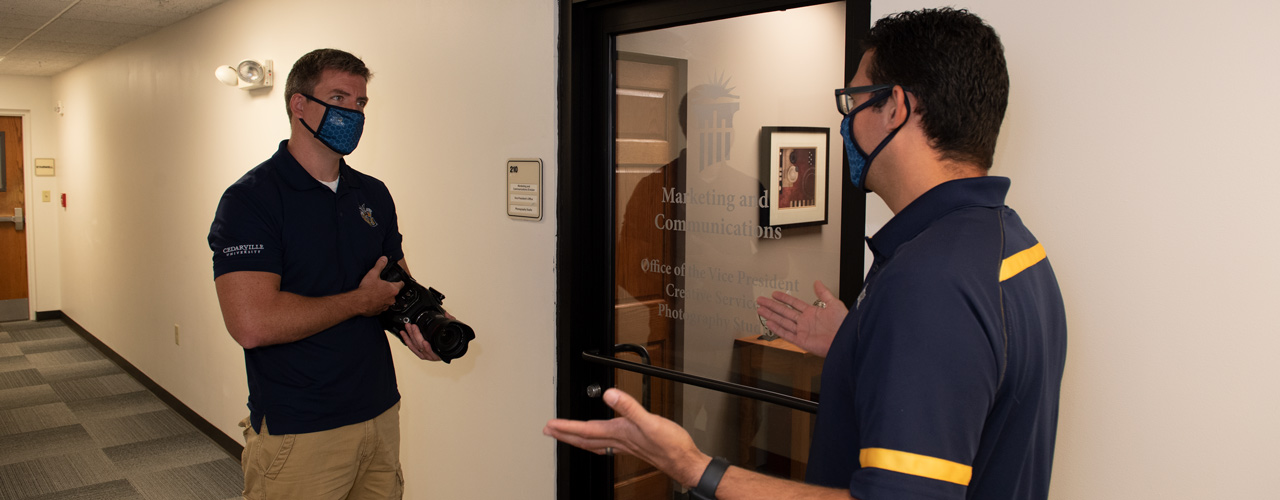by Clem Boyd, Communication Content Manager
 Most of the attention during the COVID-19 global pandemic has been on the medical and public health impact, as it should be. But what about the impact on human interactions? How has COVID-19 affected our social and relational health?
Most of the attention during the COVID-19 global pandemic has been on the medical and public health impact, as it should be. But what about the impact on human interactions? How has COVID-19 affected our social and relational health?
Dr. Michael Sherr, chair and professor of social work at Cedarville University, is editor-in-chief of the Journal of Human Behavior in the Social Environment. Inspired by fellow editor Dr. Christson Adedoyin, professor of social work at Samford University, a special issue of the journal will look exclusively at how social distancing, as a means to mitigate the transmission of COVID-19, is affecting the way humans interact.
 The special edition of the journal, scheduled for release in early to mid-2021, is receiving manuscript submissions till the end of August. So far, manuscripts have come in from Japan, the United Kingdom, Nigeria, Iraq and the United States, among others.
The special edition of the journal, scheduled for release in early to mid-2021, is receiving manuscript submissions till the end of August. So far, manuscripts have come in from Japan, the United Kingdom, Nigeria, Iraq and the United States, among others.
“Everyone is focused on a cure or finding a vaccine,” Sherr said. “But one thing not being addressed is the long-term challenges of having a new set of norms slowly making their way into how we’re supposed to operate with one another.”
“Are the masks ever going to go away? How about the way we look at each person when they sneeze or cough? How about the way we spend time together? My family went to the mall recently to do some shopping, and honestly, I don’t know if we’ll be doing that again for a while.”
Of the submissions received so far, it’s evident that social distancing is touching every detail of life. Articles so far address the influence of social distancing on food systems and food shortages, the impact on university teaching and learning, the nutrition effects of quarantining, the influence on human resource initiatives in business, and even the way it’s affected protesting after the death of George Floyd.
 “We want to know how social distancing is changing behavior,” commented Adedoyin. “We want to understand how students are social distancing at universities, the way this has impacted doctor-patient behavior, how people are adjusting in school settings, how kids and parents are adjusting at home, how churches are adjusting. This is changing the way we behave.”
“We want to know how social distancing is changing behavior,” commented Adedoyin. “We want to understand how students are social distancing at universities, the way this has impacted doctor-patient behavior, how people are adjusting in school settings, how kids and parents are adjusting at home, how churches are adjusting. This is changing the way we behave.”
By focusing on this topic for the journal, Adedoyin hopes this will become a reference if there happens to be another pandemic in the future.
“We had no knowledge base before now,” Adedoyin said. “We want to build a foundation of knowledge that can be a starting point for research, best practices and policy on how social distancing impacts human behavior.”
For Sherr, the pandemic and the efforts to constrain its spread have been a healthy and humbling reminder of how much humans don’t really control.
“As humans, we’ve created systems in our world that make us comfortable,” he said. “We lose sight of how dependent we are on the intricate and delicate balances that God created. God is always good, and he always wants what is good for us. This time has brought a clarity of priorities, realizing how mortal and finite I really am.”
Located in southwest Ohio, Cedarville University is an accredited, Christ-centered, Baptist institution with an enrollment of 4,380 undergraduate, graduate and online students in more than 150 areas of study. Founded in 1887, Cedarville is recognized nationally for its authentic Christian community, rigorous academic programs, including its Bachelor of Science in social work program, strong graduation and retention rates, accredited professional and health science offerings and high student engagement ranking. For more information about the University, visit www.cedarville.edu.


















